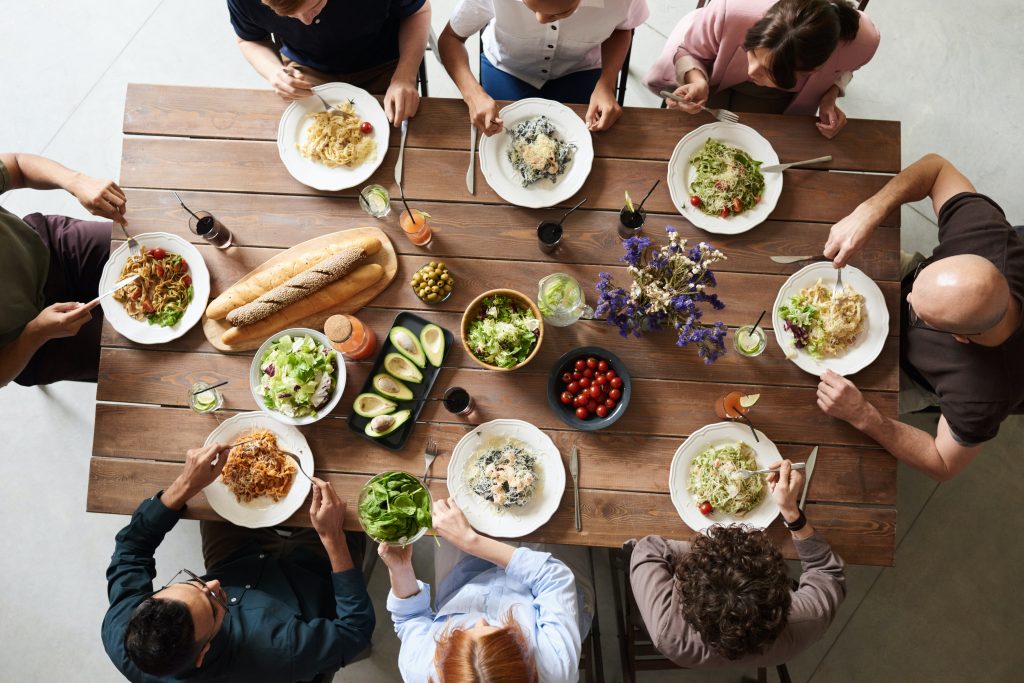Making Family Dinner Conversations Interesting Again
09.07.2021
Phones Down, Voices Up

“And now, on the Daily Family News… absolutely radio silence.”
Family dinner conversations simply aren’t the same since COVID. No longer can your kids excitedly reel off how they’ve been doing at soccer practice. Your partner can’t relay that funny thing their friend said at lunch, back in the days when you left your home and went to work.
During the pandemic, you already knew during family dinner conversations what everyone’s been up to before they even opened their mouth.
You could hear the latest rap single through the ceiling from your son’s bedroom on repeat. Your daughter gossiped on the phone for hours. You’ve been cleaning stubborn dirt from the hinges of the oven door. Your partner hasn’t moved from the sofa, and they’ve been poring over the same True Crime book they were reading yesterday and the day before.
People see right through the question. “So, what have you been up to today?” Nothing, obviously. It’s dumb that you’re even asking. Everyone goes back to scrolling through their phones and playing with their broccoli.
True, not every pre-COVID dinner had a Tarantino-level script full of zippy dialogue. But they at least provided an engaging and valuable way to check in with your family.
It’s time to bring the quality back and make family dinners a centerpiece of your group dynamic again. All it takes is some clever questions and an encouraging, open atmosphere.
Asking open questions at the dinner table is also a great way to reveal the personality traits of family members who are usually introspective or less than forthcoming. Your teens are coming into their own and developing more with every passing year. It’s crucial to get to know them as they become adults.
Team Vippi breaks the ice on how to inspire exciting family dinner conversations and unCOVID your mealtimes.
Rules of Engagement: Creating the framework for lively family dinner conversations
Family dinners are an essential time for sharing. Make sure everyone is engaged.
Yes, we know family dinner conversations should be free-flowing and unrestricted. But rules need to be in place that make sure everybody is engaged, involved, and contributing.
So:
- Absolutely no f*cking phones. They’re a death sentence for uninterrupted conversation. You don’t want your kids or partner to be messaging their friends while you’re trying to connect with them.
- Everyone has to try at least one dish. Have a few sides and salad bowls out. If your family around the table are connecting with the meal, or at least asking each other for portions and servings, it’s a sneaky way of setting the scene for further conversation.
- No dinner in your office or room. Whatever they planned on doing at the same time as eating can wait. Nobody eats in isolation in your household. You share, you connect, and you grow together.
Guidelines for making the most of family dinner conversations
These will be the guardrails of your new approach to family dinner conversations.
Slip questions in naturally. Don’t force any games, as this lends an air of deception to the conversation. Certainly don’t announce that you’re doing a Q and A. The whole point is to get a genuine perspective and avoid anyone becoming too guarded.
No politics, religion, or gun-control chat. Try to keep the meal topics deep but non-divisive. The meal needs to stay appetizing, after all.
Avoid more than two questions during any single mealtime. The whole point is that the questions inspire, and the answers have breathing room to spark further conversation.
This isn’t an interrogation – and the whole mealtime shouldn’t just be one person asking questions. It’s a dialogue, not an interview.
Pretend that the question came up with a friend. “Oh, I was speaking to X earlier, and Y came up…” Then, you explain how you answered and paint a picture of the logical steps you took to get to your response. Which facts supported your answers? What’s your personal experience on the matter?
This sets the example for your family that their responses need to be supported with facts, beliefs, and personal experiences.
Interruptions are out. If you’re leading the questions, make sure no one around the table can cut another person off. Nip any interruptions in the bud. This meal is about open-ended sharing, whatever the others present may agree or disagree with.
Go around the table and encourage everyone to contribute. The whole point of this exercise is that everybody contributes thoughts and opinions. It’s what will genuinely stimulate joy in the chat. Even if you have shy, introverted family members, everyone’s equal in this conversation.
Ask open questions that inspire further details. “Do you like…” “How many…” “When did…” What’s the common theme with all of these questioning clauses? They lead to direct and closed responses. Your teen child could respond to “When did you last enjoy a holiday?” with “2014”. That’s not the kind of answer that gives you a glimpse into their soul.
If you’re drawing their minds back to a particular time, make sure you follow up and have them add color and perspective. When asking about memories, for example, really dive into the feeling of the memory. How do they feel about it? What could they smell?
End on a cliffhanger. Admit it – when your fave TV show ends a season with a nail-biting cliffhanger, you want to know more, right? Who killed the guy? Who is the main character having an affair with? The same applies around your dinner table (except for the murder and infidelity, hopefully).
Ending your meal on either an amusing, controversial statement or an interesting follow-up to consider can stimulate conversation for the next dinner time. Let’s say your kids have never heard about your time in high school. Tease them with something like:
“Jamie’s story reminded me of a rap song my friends and I wrote in high school. I’ll have to look the lyrics up later, though. It’s been 30 years…”
Let’s be honest; if you found out your mom or pop wrote a rap at school, you’d be at least moderately curious about how bad it was, right? Drop the breadcrumbs, and have them chase you for information at the next meal.
The 10 best family dinner questions for adults and children

Team Vippi did some digging, and these are the best examples of questions we’ve slipped into casual family dinner conversations around the table.
1. Favorite trip
Slipping it in: “I was in the garden the other day, and The Cha Cha Slide came on the radio. It reminded me of that amazing vacation we had in Guadelupe – you loved dancing to it as kids. And I loved scuba diving so much. It’d be so good to go again. What was your favorite trip away as a family?”
Follow-up: “And why that one? What do you remember being so good about it?” or “Where do you want to go next?”
Reasoning: Memories, and especially those of a shared experience, are a powerful connector. If you can draw your family’s minds back to a particularly great vacation, you’ll each start sharing anecdotes from that vacation, and voila! The conversation is a-rollin’.
Asking where they’d like to go next generates optimism, excitement, and even genuine options for a future family vacation if enough people get amped up about a particular idea.
2. If you were the Mayor…
Slipping it in: “Man, I can’t believe they shut down that Mexican restaurant on I-6. If I ran this town, I’d make every building have a restaurant! How would *you* change this town if you were running it?
Follow-up: “Why would that make this town better?”
Reasoning: This is great for kids and adults – it opens the possibilities for spectacularly dumb, funny responses and serious, thoughtful answers. And, quite honestly, it’s never possible to know which tone each generation is going to pick.
You get to see their ideas for the world around them in motion (or at least witness their sense of humor about where they live).
3. The best day of your life
Slipping it in: “You guys are so great. When you were born, it was the happiest day of my life. I still remember your little bobble hat and your legs dangling off my arm. What was the best day of your life?”
Follow up: “What do you remember about it?”
Reasoning: It’s always important to know what moments your family holds dear – after all, those are the parts of life that make everything worth it.
So what day brought them the most joy? Did it involve family? Friends? Was it solo or with others? Did it revolve around achievements? Fun? New family members? Personal relationships? Surprises?
There are so many factors that shape a person and highlight their priorities. This question is one way to help you identify their values and shape how you relate to your family members as individuals.
4. Idols
Slipping it in: “I watched a documentary about Bruce Springsteen the other day. He’s just my idol. I love how versatile his songwriting is and how there isn’t a mood he can’t capture. The fact he’s managed to stay super down-to-Earth also really impresses me. Come on then, who do you look up to?”
Follow-up: “Oh, so what is it about them you like?”
Reasoning: Our icons don’t define us, but they represent the attributes we look up to. Whether the person answering is younger or older, picking a figurehead allows you to discuss and compare qualities, ambitions, and ideals.
Compassion? Success? Talent? Intelligence? Strength? They’re all important, but who you look up to can give away which characteristics you value the most.
Almost everyone has different heroes. Some family members may even pick fictional characters – and that’s fine. Whatever stimulates discussion and gives you an impression of their inner world is good enough.
5. Failures
Slipping it in: “I failed my driving test three times as a kid. The third one ended in 5 minutes. But I figured out how to get by without a car and travel all over. Then, in adulthood, I learned how to conquer that hangup and get back behind the wheel. What’s your greatest failure? No judgment at all.”
Follow-up: “That’s fine, though! It’s all about what you learn from it. What did you take away from that experience?”
Reasoning: This gives you a chance to accept that not everything’s perfect and that flaws are acceptable, as long as we learn from what goes wrong. It’s an excellent chance for your teens and partner to get off their chest what they’re unhappy with or embarrassed about and work out takeaways from their failures.
Sharing their embarrassment might mean another family member gains solace from their confession and takes lessons away about coping with their own failures.
Failure isn’t intrinsically wrong. It’s always a learning opportunity, and this question allows you to shine a positive light on negative moments.
6. A perfect day.
Slipping it in: “Sometimes, I just wanna pack up my job and spend everyday fishing. Then, at night, we’d all be around a fire, cooking the fresh fish while Dylan whips out the guitar and sings for us. That’s just perfection to me. Hey, what does your perfect day look like?”
Follow-up: “Would your perfect day still look the same if you had all the money in the world? What would you do instead?”
Reasoning: This is not the same as the “best day of their life” question. This doesn’t relate to a specific thing that happened. Instead, given all the time and resources in the world, how would they spend a day.
It’s an excellent question because it involves pretty much all of the elements you’d want to bring to family dinner conversation – optimism, imagination, personal experience, and values.
7. What are skills for?
Slipping it in: “I wish I could play every instrument – just pick one up and know exactly what to do. I always get so jealous of musicians. What’s the one thing you wish you could do?”
Follow-up: “That’s awesome! Great call. What would you use it for?”
Reasoning: Your partner might be mature enough to know what they’d want to bring to the world with more skills but not know what they want those skills to be.
On the other hand, your teen children might know what skills they’d like but have no idea how to use those skills in the real world.
Opening up a dialogue across generations that intertwines purpose and ambition is a great way to talk about a rich topic: Whether skill for skill’s sake is enough, or whether those skills should always have a more significant role in the world.
8. Missing people.
Slipping it in: “I really miss my brother. The fact that he’s on the other side of the world gives me a little twinge of sadness every single day. Who do you miss in your life?”
Follow-up: “What would you do with them if they showed up right now?”
Reasoning: COVID has separated people. Your teens will miss their school buddies. You and your partner might be missing the parents, friends, or siblings you haven’t seen in ages and with whom you have limited time.
It’s okay to feel longing and sadness, but it doesn’t have to be framed in a negative light. Fill your family’s heads with positive thoughts of what they’d do with the people they miss if they were waiting by the door at that moment.
It seems bittersweet, but giving them space to bask in that person’s better qualities is super kind.
They can speak to them on Zoom most of the time – it’s not a complete separation. So this allows your family to vent their emotions, nurture their extrafamilial attachments, and look forward to the next time they see someone they miss.
9: Casting your biopic
Slipping it in: “We watched One Night In Miami yesterday. The guy who played Muhammad Ali was amazing! I think they should make a movie about us. Who do you reckon they’d have playing us? I call dibs on Brad Pitt/Jennifer Lawrence (delete as appropriate).”
Follow-up: “Oh yeah? Who would play the bad guy?”
Reasoning: This is simply a flat-out fun question. Casting people as actors allows for caricatures, hilarious comparisons, and people desperately trying to claim actors they look nothing like. (“I *promise* you Richard Gere would play me.”)
You can dive deep into movie folklore here – what genre would your biopic be? Action? Comedy? Tragedy? You can also see who people in your family feel the bad guy is. Do you share common ground?
This question is a fun way to detect any tribulation in the family’s social scene without asking outright. It’s also a less fun way to find out how little you look like Richard Gere.
10: Helping hands
Slipping it in: “Y’know, I saw Kelly getting groceries for Mrs. Connors across the street. That was so lovely, especially when she’s not very mobile anymore. I must make a mental note to help more people out. Give me some ideas.”
Follow-up: “Like, what was the last thing you did for someone else? I need some inspiration.”
Reasoning: When is it not a great thing to inspire compassion for others? Talk about the role your family can play in making the world a better place, even just for a few people. This can unite different generations.
Everyone comes up with ideas about what to do, and everyone has different notions of who to help – and what even constitutes help. Are they thinking of charities? Assisting on a personal level? Just doing extra stuff at work to chip in?
Working out people’s boundaries on charity will show you how their brain works and what values they have.
The Roundup.
It might seem easy – they’re your family, after all. But making sure they all connect during family dinner conversations takes some due diligence (and some mild sneakiness).
A family that talks around the table is engaged and unified, even if people have different opinions.
Team Vippi Family is glad we had this chat with you!


















